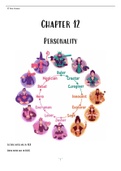© Ane Venter
Chapter 12
Personality
Lecture notes are in RED
Extra notes are in BLUE
1
,© Ane Venter
The Nature
Of Personality
1. Defining Personality: Consistency and Distinctiveness
2. Personality Traits: Dispositions and Dimensions
3. The 5-Factor Model of Personality Traits
1. Defining Personality: Consistency and Distinctiveness
→ Personality = refers to an individual’s unique set of consistent behavioural traits
○ Explains why people do not react the same way in similar situations
○ Concept of personality = used to explain:
a. The stability in a person’s behaviour over time and across situations (consistency)
b. The behavioural differences among people reacting to the same situation (distinctiveness)
→ Quality of consistency across situations lies at the core of the concept of personality
→ Distinctiveness = also central to concept of personality
→ Each person has a distinctive set of personality traits
2. Personality Traits: Dispositions and Dimensions
→ Personality trait = durable disposition to behave in a particular way, in a variety of situations
→ Adjectives describe dispositions that represent personality traits
→ Factor analysis:
○ Correlations among many variables are analysed to identify closely related clusters of
variables
○ If the measurement of several variables correlates highly with one another = assumed that a
single factor is influencing all of them
○ Used to identify hidden factors = basic, higher-order traits that determine less basic, but
more specific traits
3. The 5-Factor model of Personality Traits
→ Robert McCrae and Paul Costa = used factor analysis to arrive at a much simpler 5-factor model of
personality
→ most personality traits are derived from these 5 higher order traits.
2
, © Ane Venter
i. O - openness to experience
○ Associated with curiosity, flexibility, vivid fantasy, imaginativeness, artistic sensitivity,
and unconventional attitudes
○ Tend to be tolerant of ambiguity
○ Less need for closure on issues
ii. C - conscientiousness
○ Tend to be disciplined, well-organised, punctual, and dependable
○ Associated with strong self-discipline and ability to regulate oneself effectively
○ Referred to as constraint in some trait models
iii. E - extraversion
○ Characterised as outgoing, sociable, upbeat, friendly, assertive, and gregarious
○ More positive outlook in life
○ Motivated to pursue social contact, intimacy, and interdependence
iv. A - agreeableness
○ Tend to be sympathetic, trusting, cooperative, modest, and straightforward
○ Associated with constructive approaches to conflict resolution
○ Correlated with empathy and helping behaviour
v. N - neuroticism
○ Tend to be anxious, hostile, self-conscious, insecure, and vulnerable
○ Tend to overreact more in response to stress
○ Exhibit more impulsiveness and emotional instability
3




